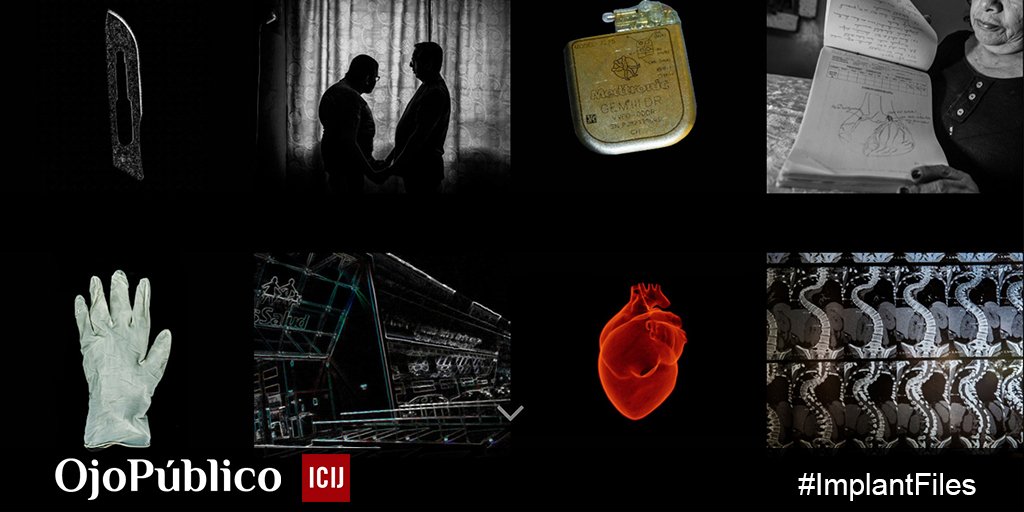问题医疗设备 — 以及相关法规和执法的缺失 — 已经害死了数千名全球的患者,并使得数以百万计的人处于危险之中。但是,在我的国家和许多其他国家,几乎没有人了解这种危害。几百万美元级别的医疗移植以及医疗设备企业牵涉进大量充斥着利益冲突、贪腐以及对患者不当操作的丑闻之中。
这就是国际调查记者协会 (ICIJ) 召集来自全球36个国家的超过250名记者以曝光医疗科技行业阴暗面的原因所在。
成果就是移植文件,第一起曝光了暴利医疗设备行业的肮脏秘密的全球调查。作为ICFJ奈特奖学金项目的一部分,我为报道队伍提供咨询建议,发现过去十年里,这些设备牵涉到了82,000宗死亡案例以及170万伤情。
为了报道这个故事,团队没办法简单寻求一个官方的关于问题医疗设备的安全警示的全球数据库。没有这样的数据库存在。
因此,这个项目中的记者开发了拥有搜索功能的专属数据库,可以使得用户查询超过77,000条与医疗项目的召回以及制造商的安全警示相关的提示,这些数据设计超过11个国家。
我的角色是为从事拉美“移植文件”项目工作的记者团队提供咨询建议,包括在墨西哥,秘鲁,阿根廷,厄瓜多尔以及智利。我协助跨境分享数据和故事线索,并引导团队搜集和分析数据。

超过1,500条公共信息请求
对于“移植文件”而言,记者们在36个国家发出了超过1500条公共信息请求,并且我们编纂了800万条关于医疗设备的健康记录。这些数据包括召回提示,安全警示以及医疗科技企业的法律和金融资料。
FDA报道
ICIJ团队帮助我们获取了接触关于超过540万医疗设备相关事件的信息,这些信息在过去十年间被报道给了美国食物及药品管理局。在这些报告中,医生、制造商、患者以及律师会描述疑似导致或有助于严重伤害乃至死亡的案例。在医疗设备发生操作下次的情况之中,报告示意,如果相关设备再次使用,可能造成伤害。
来自本地机构的文件
大多数的拉美国家对于进口到本国的医疗设备都只有薄弱的监管系统。本地监管机构会收到多种种类的关于召回产品和安全警示的报告,但是这些信息并不都是实时地系统性地获得分享的。
尽管医疗设备行业是在全球尺度运作,但公共监督并不是跨境统一标准的。相同的产品在各国有不同的名字,当产品或者系列产品号码可查时,又经常变化,使得跨境监管变得非常困难。这种情况就催生了严重的问题:在美国和欧洲被召回的问题医疗设备往往会被进口到世界的其他国家。
进口数据库区
一种重要的数据输入来自于进口到拉美的医疗设备注册。为了访问相关信息,我们使用Datasur服务 — 这是一种包含23个国家的外贸信息的工具。
In Peru, Chile, Argentina, Ecuador and Mexico, we organized a database of imports from Jan. 2009 to Oct. 2018. This allowed us to build a second database from which we gathered information about manufacturers, importers, distributors, forms of shipping and the batch and model numbers of the devices that arrived in these countries.
Algorithms in the service of health
For The Implant Files, ICIJ created an automatic learning algorithm that analyzed millions of incident reports that were presented by manufacturers to the FDA. That’s how we discovered nearly 500,000 reports from the last decade on explant surgeries related to medical devices.
The findings were jaw-dropping: These devices were associated with 82,000 deaths and 1.7 million bodily injuries over the last decade.
Doctors and conflicts of interest
Some doctors don’t disclose their links with transplant manufacturers even though the medical opinions they offer are biased. The medical device industry is fiercely competitive. On multiple occasions they have threatened police, as well as financial and medical authorities throughout the world, ICIJ revealed. Since 2008, manufacturers paid regulatory bodies in the U.S. and in other countries at least $600 billion dollars to resolve accusations of corruption, fraud and other violations of the law.
You can read more of the findings here.
 Fabiola Torres is an ICFJ Knight Fellow and co-founder and editor of OjoPúblico, an independent, nonprofit Peruvian newsroom known internationally for its award-winning investigative journalism. As an ICFJ Knight Fellow, Torres is strengthening journalists’ digital investigative reporting skills to improve coverage of corruption, transparency and governance issues in Latin America.
Fabiola Torres is an ICFJ Knight Fellow and co-founder and editor of OjoPúblico, an independent, nonprofit Peruvian newsroom known internationally for its award-winning investigative journalism. As an ICFJ Knight Fellow, Torres is strengthening journalists’ digital investigative reporting skills to improve coverage of corruption, transparency and governance issues in Latin America.
A version of this article was originally published by OjoPúblico. It was republished on IJNet with permission.
Main image courtesy of ICIJ.

